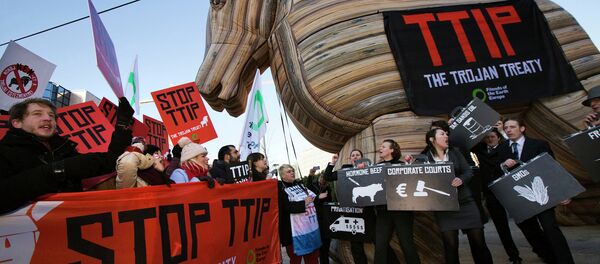The TTIP would create the biggest trading zone in the world, opening up the EU and US markets to each other. However, the talks have been mired in controversy because of their secretive nature, disagreements over regulatory issues — food safety and genetic modification in particular — and the contentious Investor-State Dispute Settlement (ISDS) mechanism.
Malmström said she is worried that the TTIP negotiations — which have been going on for over three years — are facing growing criticism, with protests in Germany and France warning that the deal could be called off. She blamed EU leaders, saying: "In this area, I don't think they are doing enough".
French President Francois Hollande has threatened to scupper the TTIP negotiations amid growing differences between the EU and the US over food safety and cultural issues. "We will never accept questioning essential principles for our agriculture, our culture and for the reciprocity of access to public [procurement] markets. At this stage [of the talks] France says 'No!' " Hollande told a meeting of left-wing politicians in Paris.
"I note that it's the beginning of a general election campaign in France and then it's always fashionable to hit trade issues. But the French government has not in any way asked us to suspend the negotiations. This criticism was never brought to us in any way," Malmström said.
Last week, for example, a poll showed that 70% of Germans believe that a TTIP deal would bring "mostly disadvantages", up from 55% in a similar poll in June 2014, with almost 80% of those questioned mentioning consumer rights as being the biggest worry.
German Opposition
A survey in the first week of May, conducted by German broadcaster ARD, found that 70 percent of Germans believe the TTIP has more disadvantages than advantages. Only 17 percent said they consider the deal to be advantageous for Germany.
One of the major stumbling blocks has been over the detail of regulatory difference between the US and the EU. None is more important than food and farming — affecting what people put in their mouths.
Food regulations in the EU and the US are different, with the EU being less open to Genetic Modification that the US. In order to have a trade agreement, the two sides need to agree on a common regulatory framework.
New report highlights the serious damage TTIP could do to UK Agri-Food. https://t.co/fcfOAe4Uee pic.twitter.com/3n90aRQfG7
— LEAVE.EU (@LeaveEUOfficial) May 5, 2016
In the event of a US firm not being allowed to sell is products — such as excludes beef and pork treated with growth hormones, chicken washed in chlorine, fruit and vegetables treated with endocrine-disrupting pesticides and genetically engineered and modified foods — in the EU, the firm could sue the EU or member states.
Such a situation would trigger the controversial Investor-State Dispute Settlement (ISDS) mechanism, which critics say is a secretive trade tribunal system, separate from EU member states judiciary systems.



